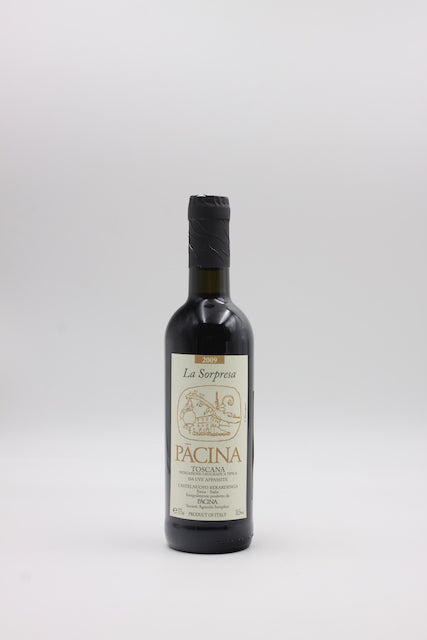Free shipping within Austria from € 99
Free shipping to Germany from € 120
Shipping costs within the EU
Payment methods
Pacina
Castelnuovo Berardenga – Toskana
Pacina is much more than just a winery.
It is a small, secluded place hidden in the woods near Castelnuovo Berardenga, where biodiversity is lived and celebrated. In addition to vines, ancient grains like spelt, as well as olives and chickpeas, are cultivated. But above all, Pacina is the life project of Giovanna and Stefano Tiezzi, who—together with their adult children Maria and Carlo—farm the land and craft wines that give a truly authentic voice to classically made Sangiovese.
The still-intact walls of Pacina date back to the 10th century and were once inhabited by monks. However, viticulture on the surrounding lands likely began much earlier—possibly during the Etruscan era. The name "Pacina" itself is believed to derive from Pacna, the Etruscan god of wine.
Giovanna Tiezzi’s family took over the estate about a century ago and have always farmed the land—both fields and vineyards—without the use of pesticides or synthetic agricultural chemicals. Quite the opposite: Giovanna’s father, Enzo, was an environmentalist and conservationist before such terms even existed. In 1980, he hosted the first meeting of Legambiente, now one of Italy’s leading environmental organizations, right at Pacina. Her mother, a biologist, wrote early and influential papers on the fundamental role of biodiversity in preserving ecological balance—especially in the face of increasingly monoculture-based agriculture.
Giovanna and Stefano, a trained agronomist, have continued in that spirit. The estate comprises about 10 hectares of vineyards, planted mainly with Sangiovese, rooted in sandy, clay-rich soils with a notable presence of limestone. The vines are complemented by Ciliegiolo, Canaiolo, Syrah, and the white varieties Trebbiano di Toscana and Malvasia di Chianti.
In the vineyard, interventions are kept to a minimum. What matters is the dialogue between grower and vine, based purely on observation and deep familiarity with the land. In the cellar, this philosophy continues. The team avoids the growing arsenal of oenological products and manipulations, allowing the wine to “become” on its own terms. Fermentation is spontaneous, driven by native yeasts and carried out in cement tanks. Aging typically takes place over extended periods in used wooden barrels—except for the entry-level wine Donesco, which sees a shorter maturation.
A Statement of Principle
Until recently, Pacina was a member of the Chianti Classico Consortium. But due to regulations that increasingly replaced and distorted the long-standing traditions of Chianti with international grape varieties and market-driven trends, Giovanna and Stefano decided to withdraw from the consortium.
Ironically, their wines remain truer to the region's roots than many officially approved Chianti Classicos. Their core expressions—Pacina (equivalent in style and structure to a Chianti Classico Riserva) and Donesco—are deeply traditional, honest, and alive.
Pacina is also an agriturismo, offering a haven for travelers who would rather explore the Crete Senesi than the Uffizi (though Florence is just an hour away). It is a place of nature, family, history—and above all, meaning.




